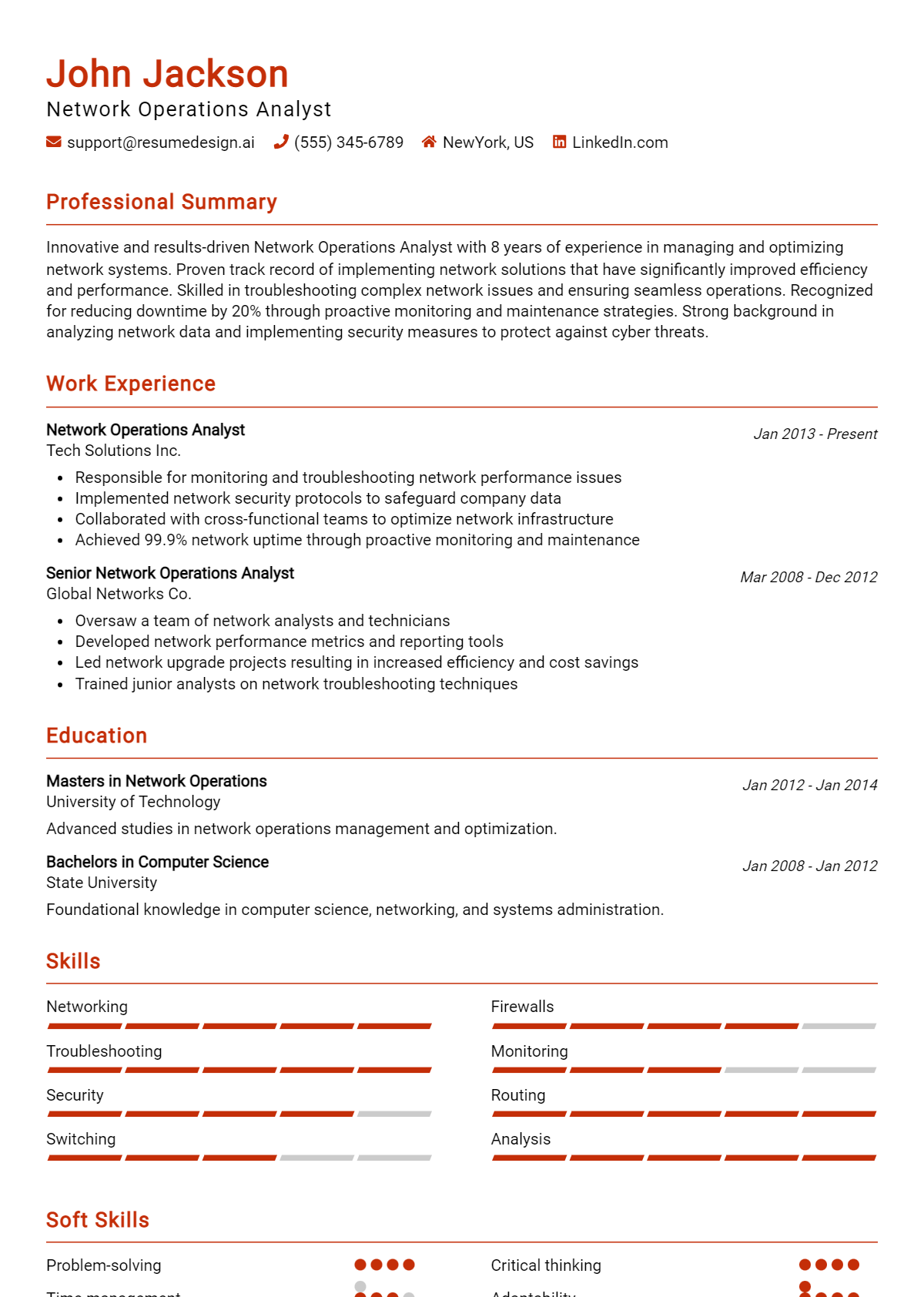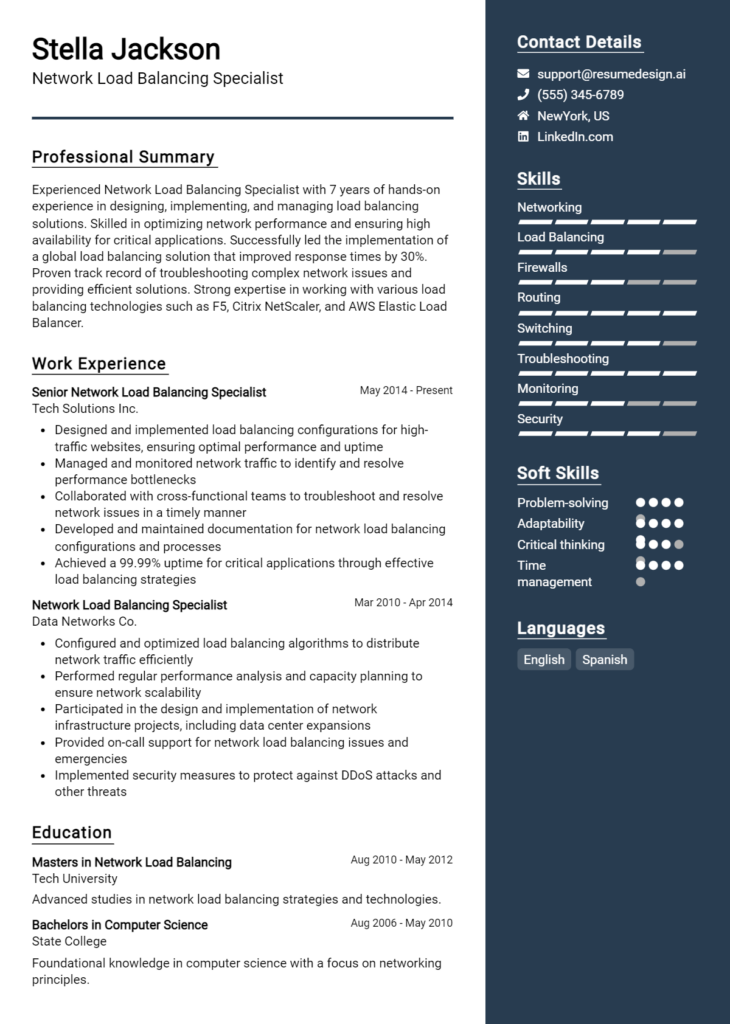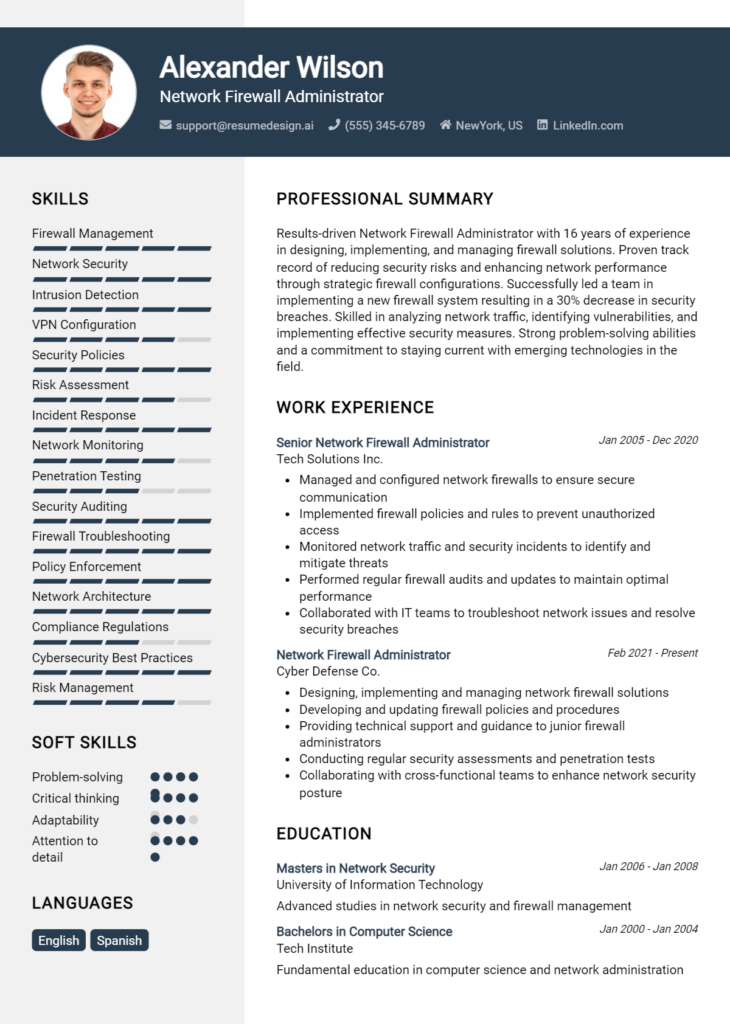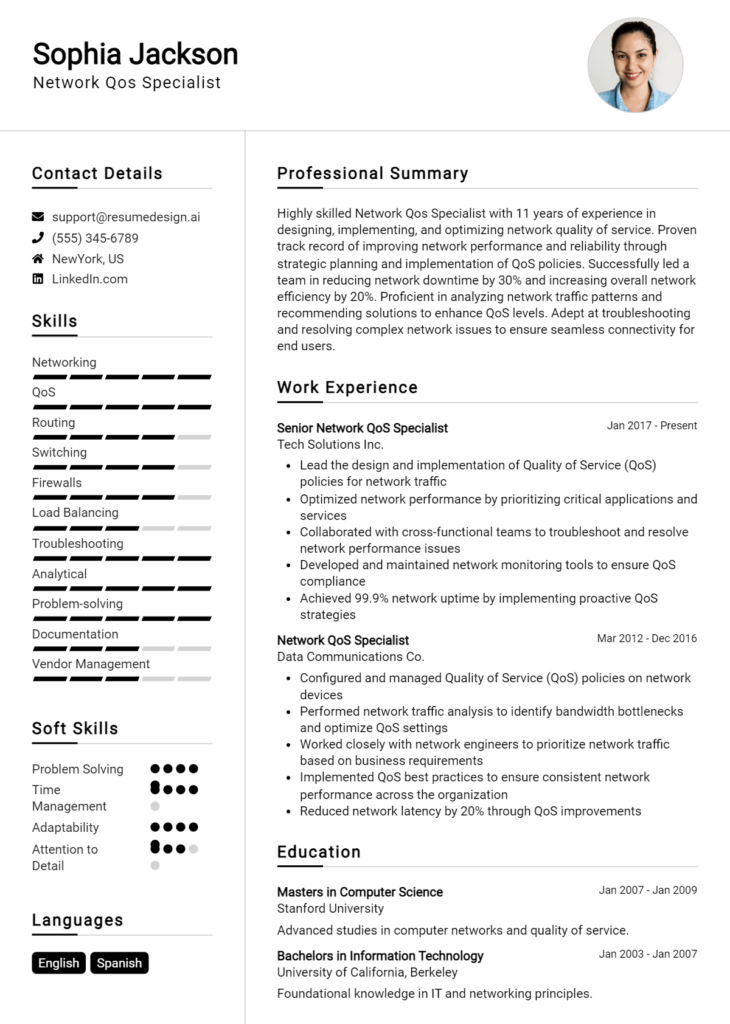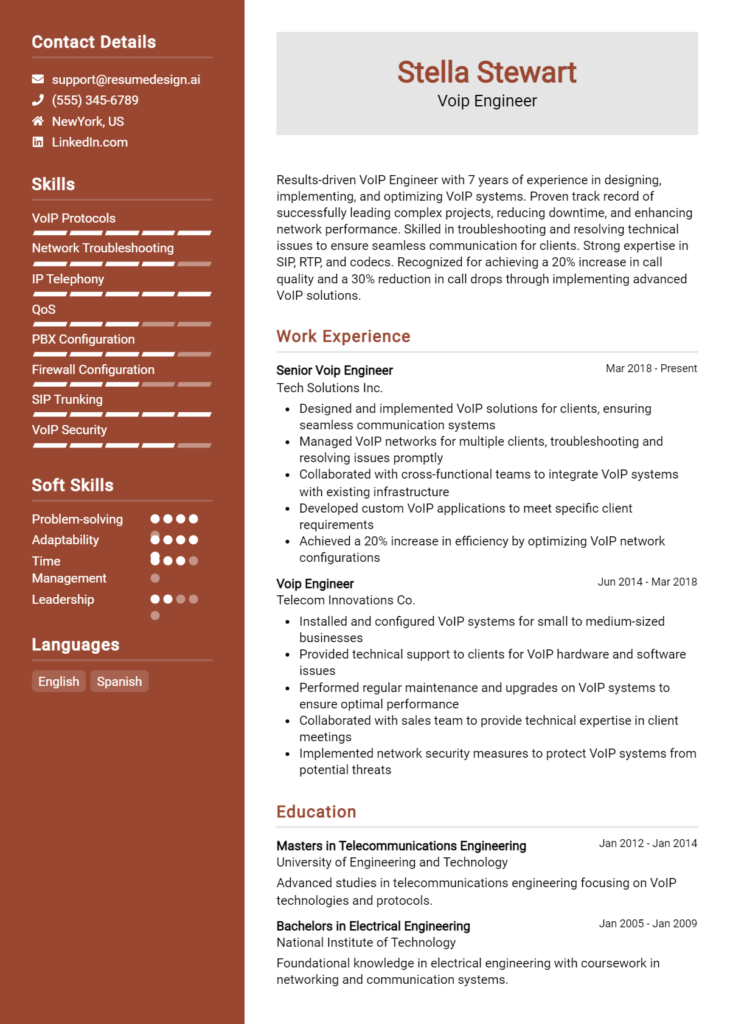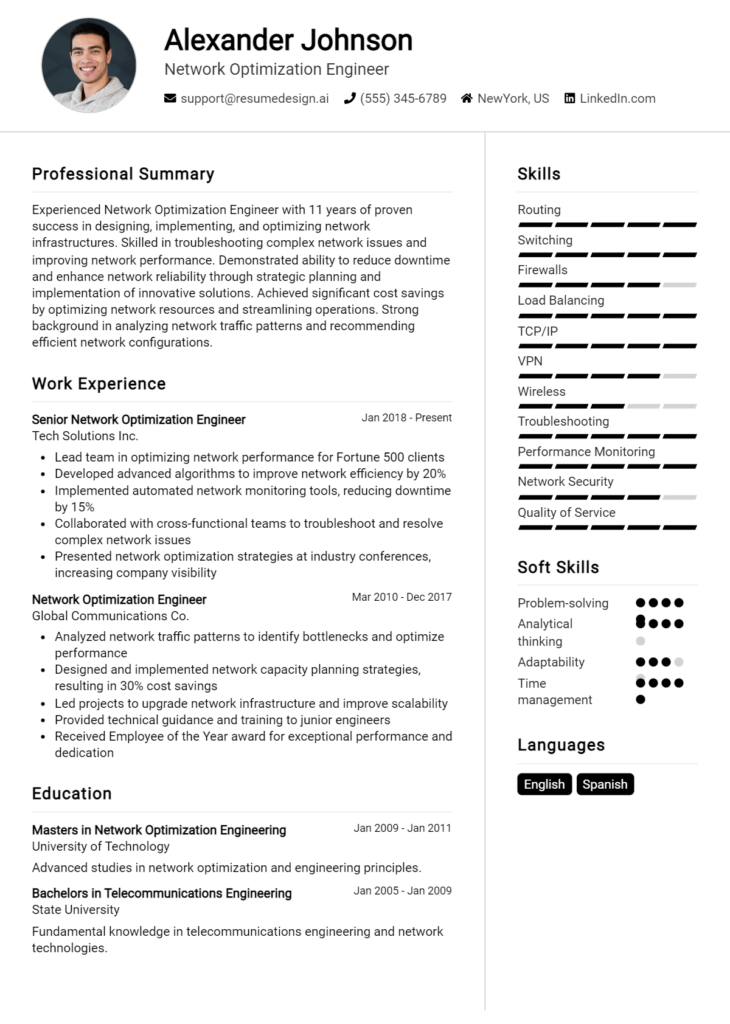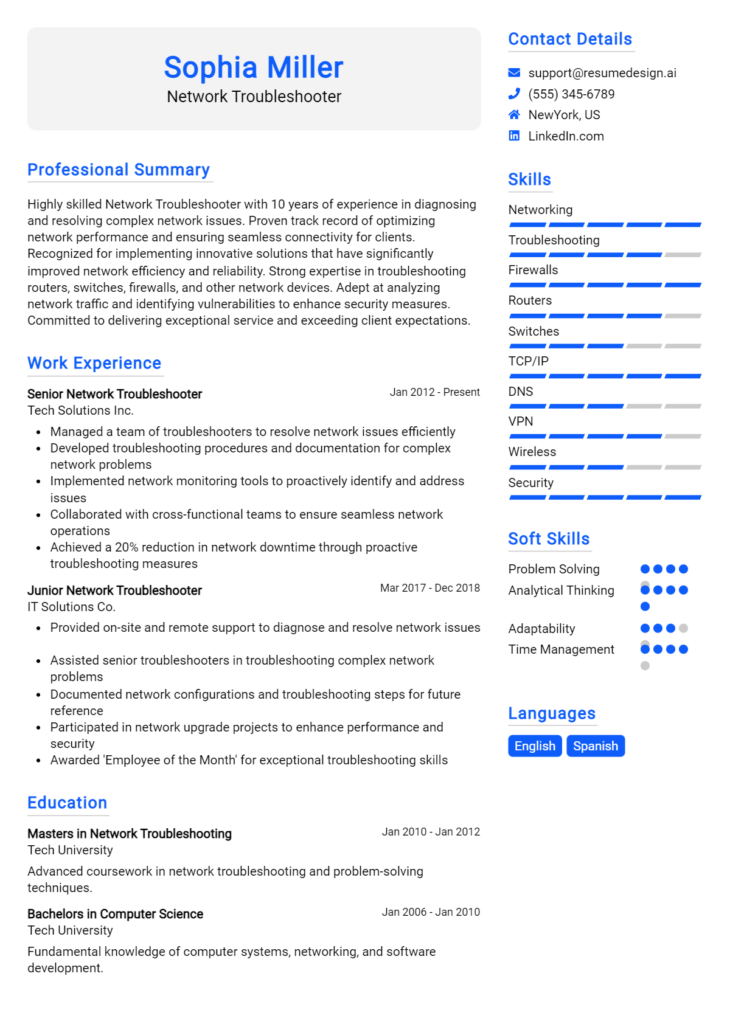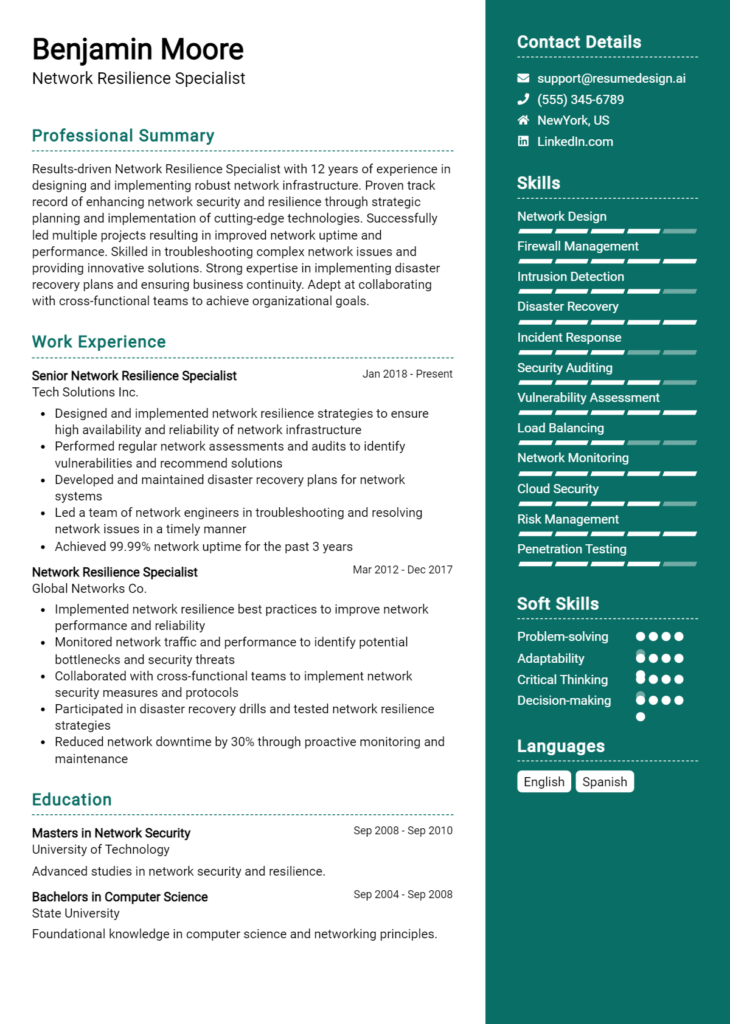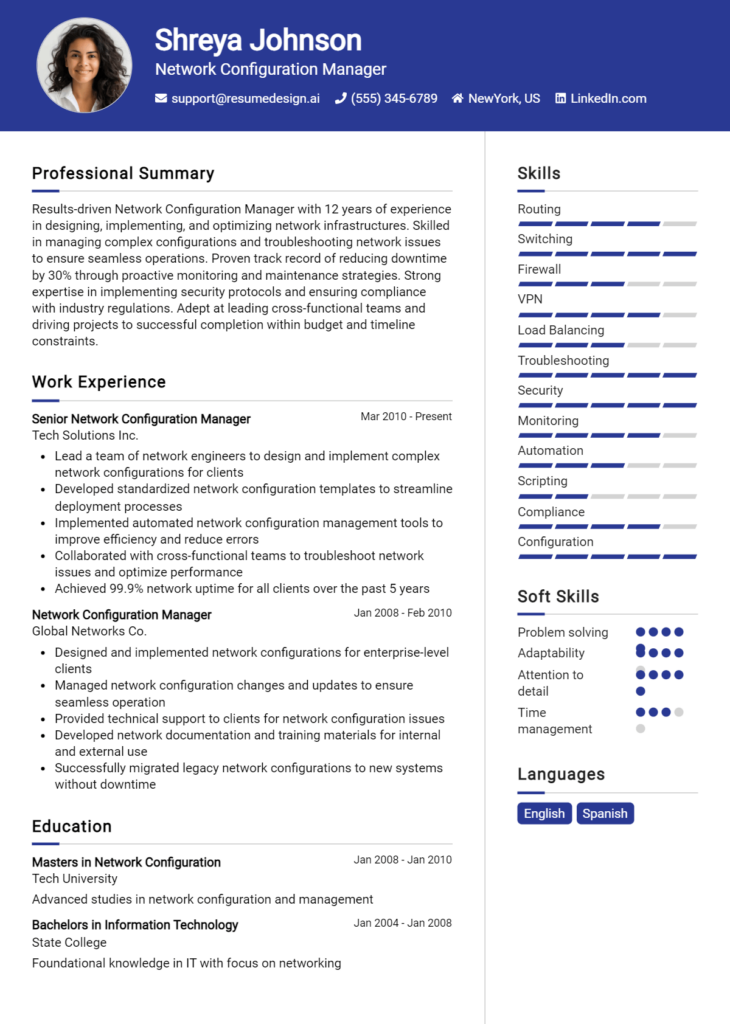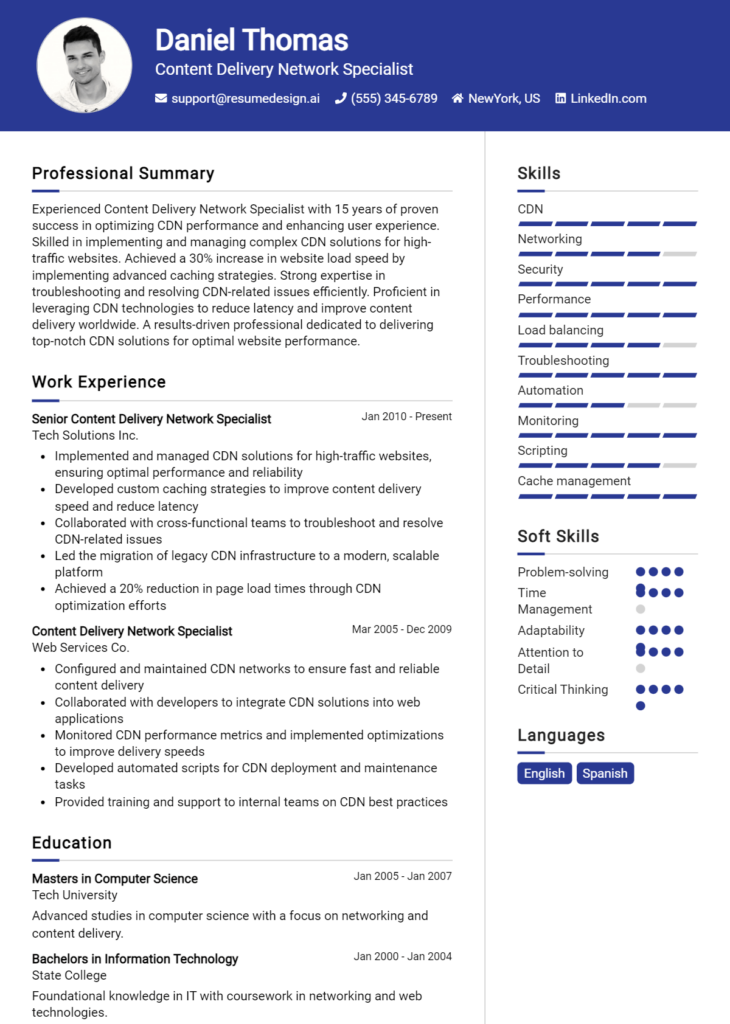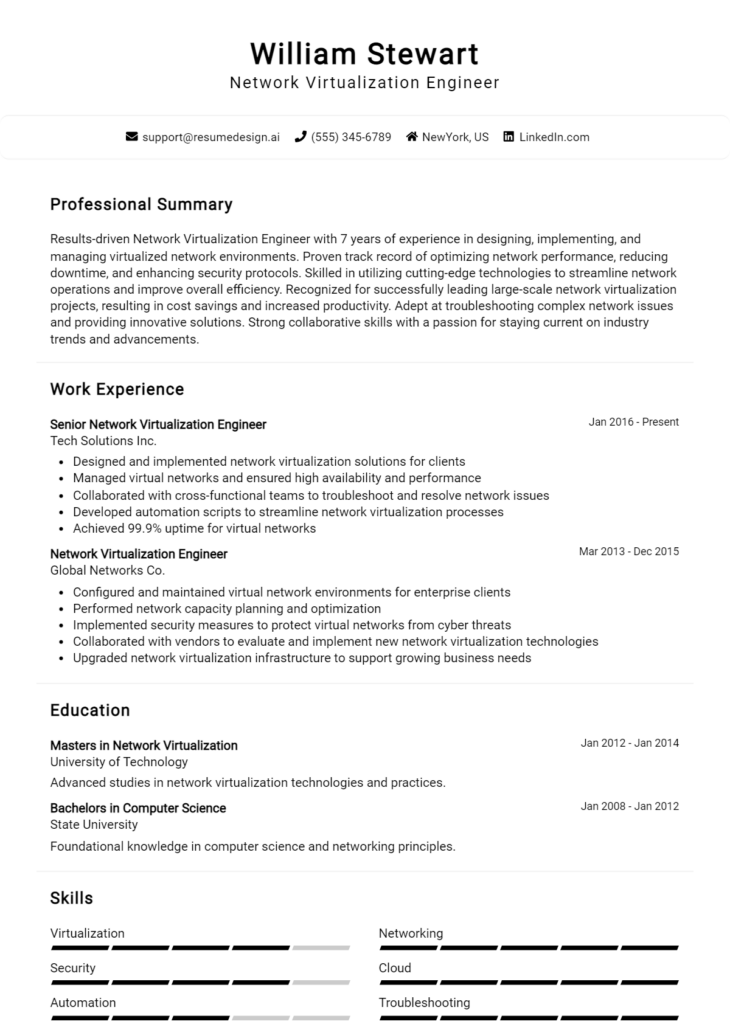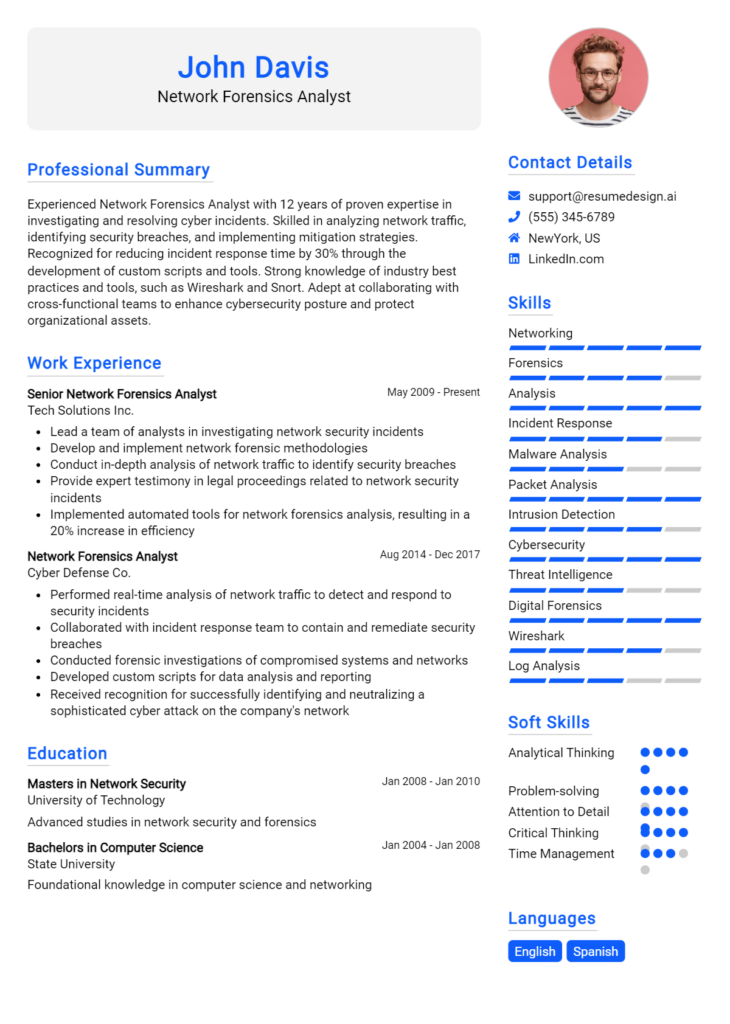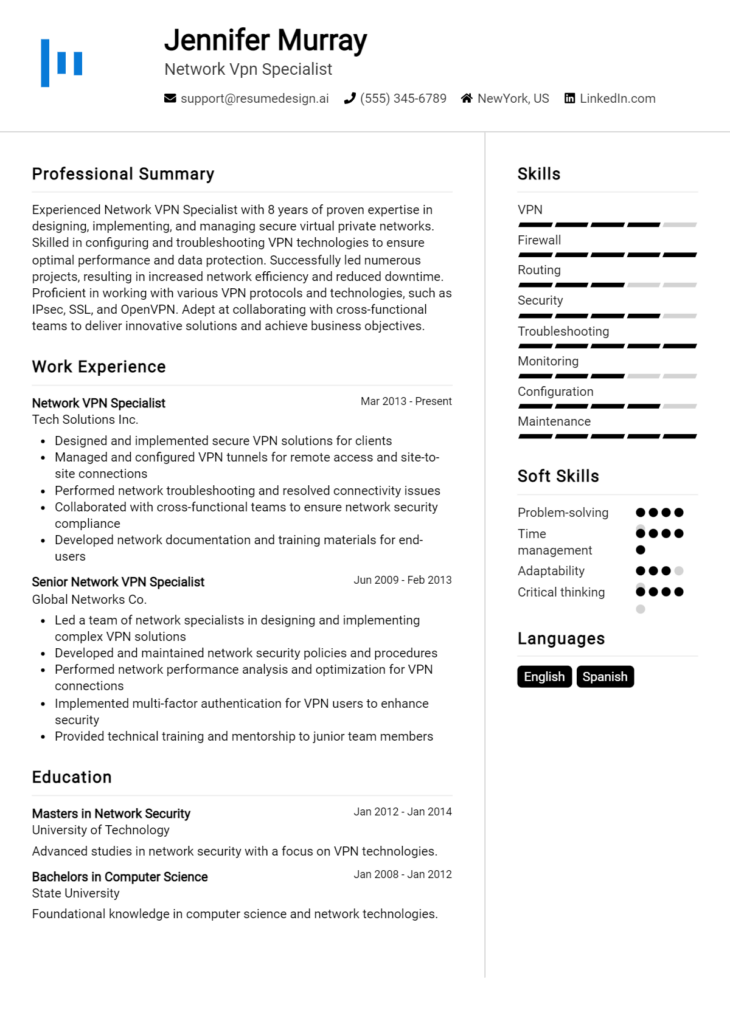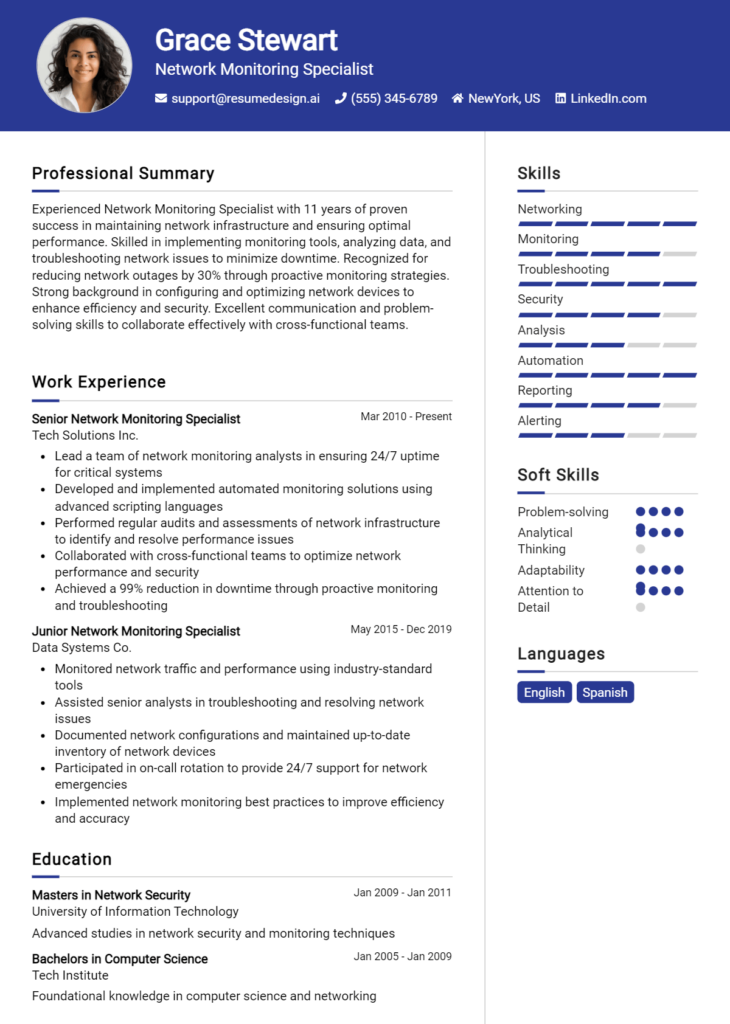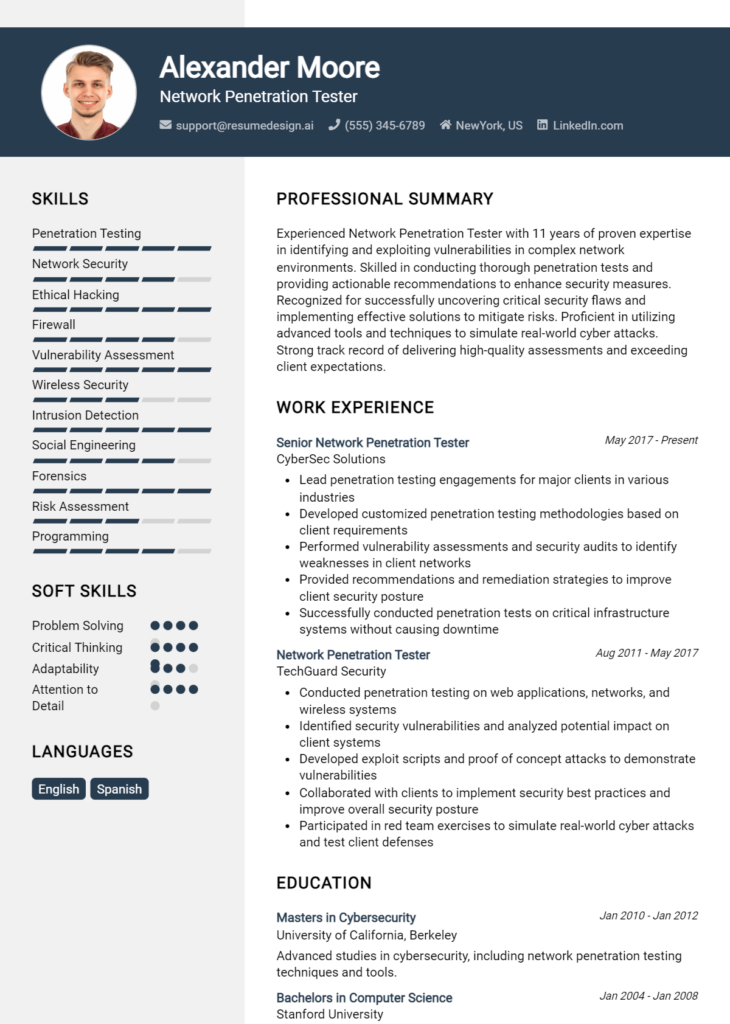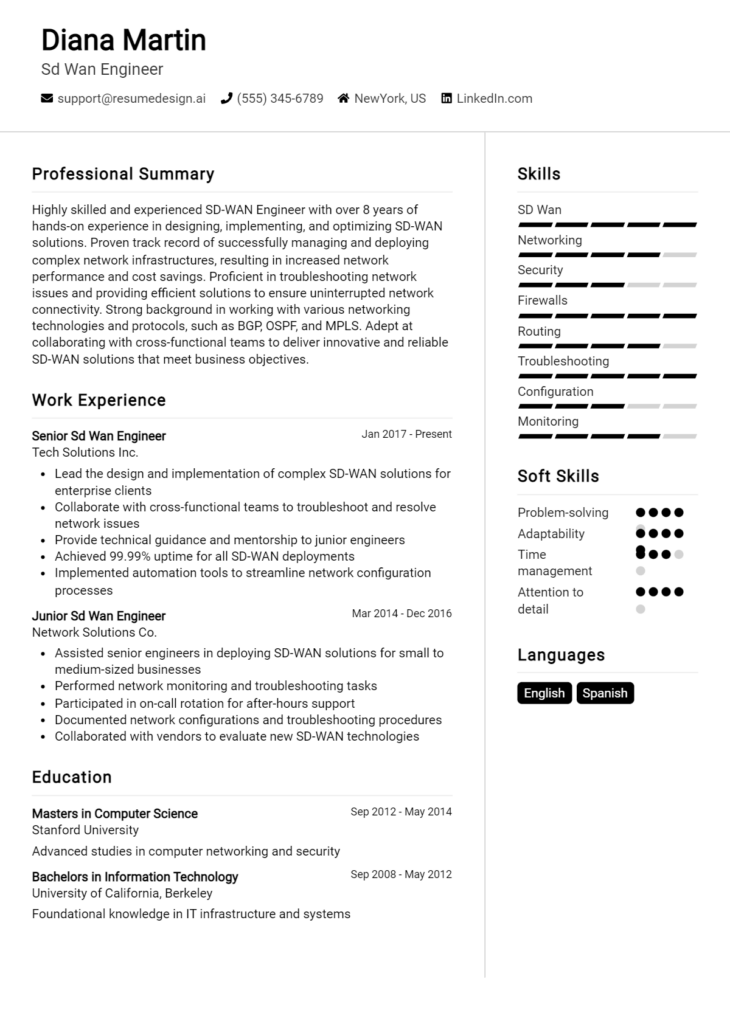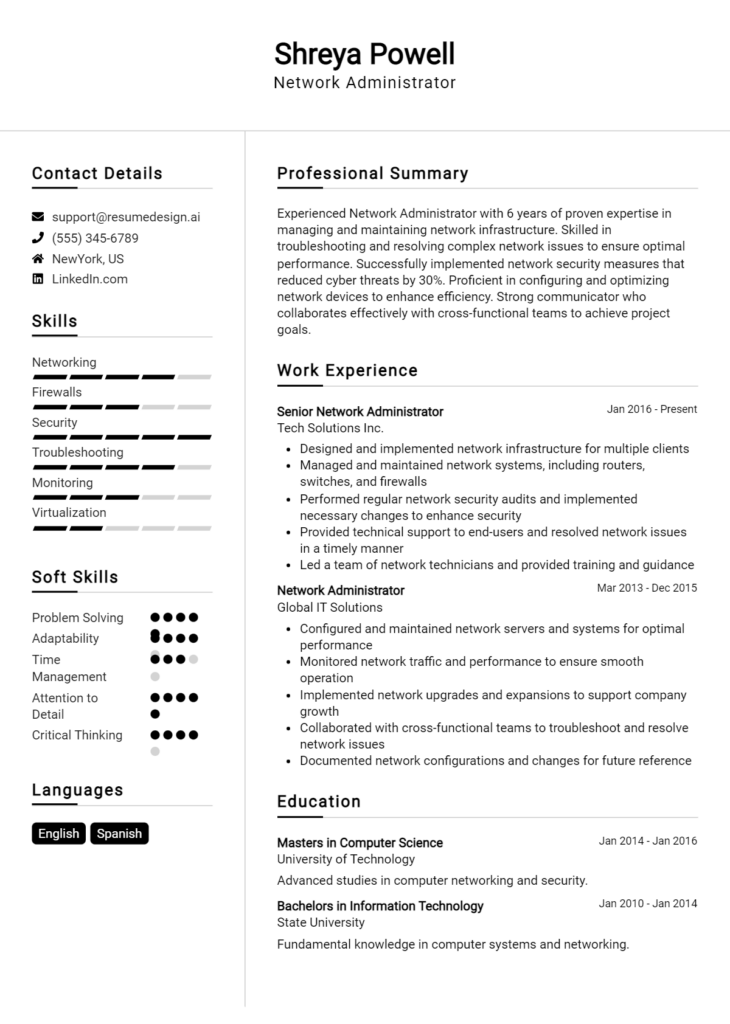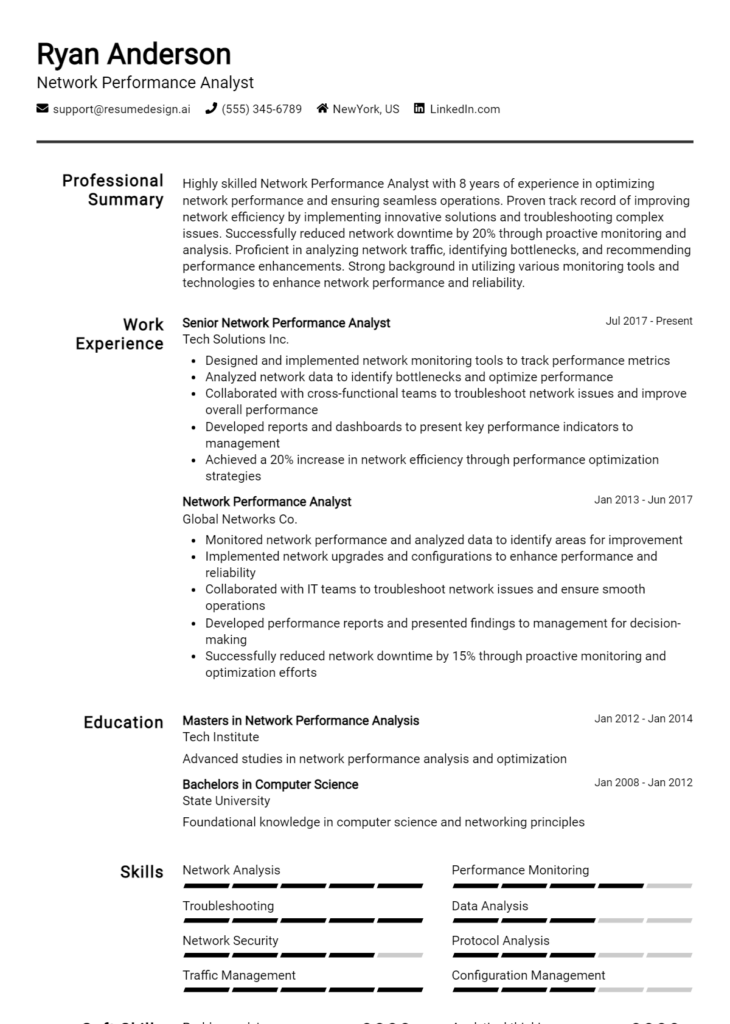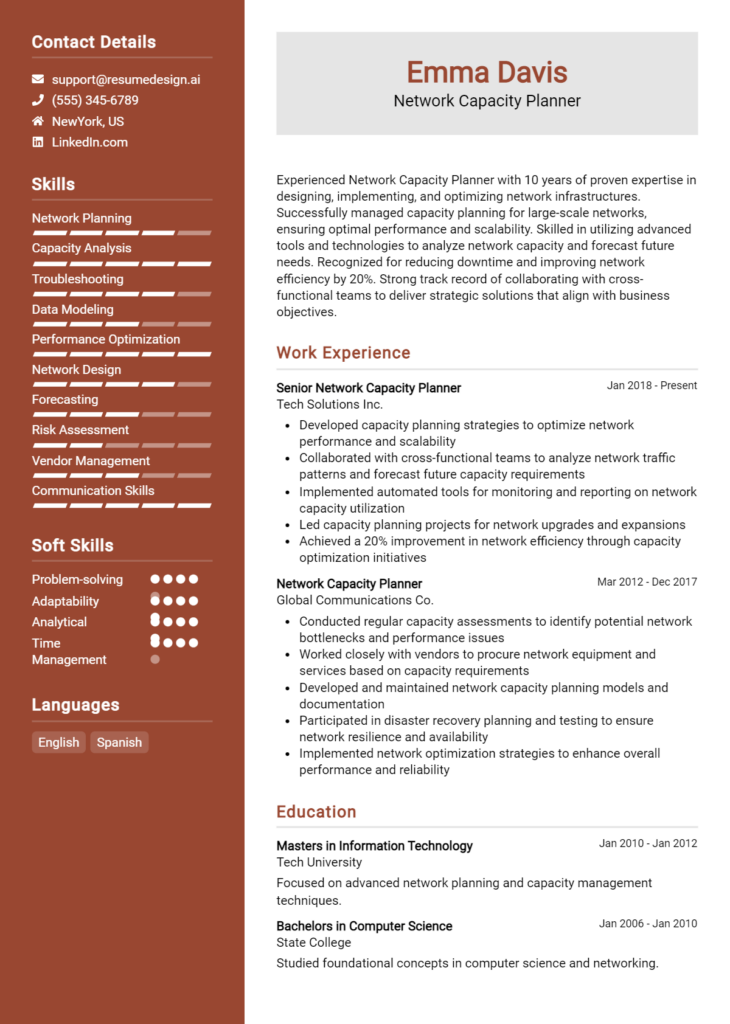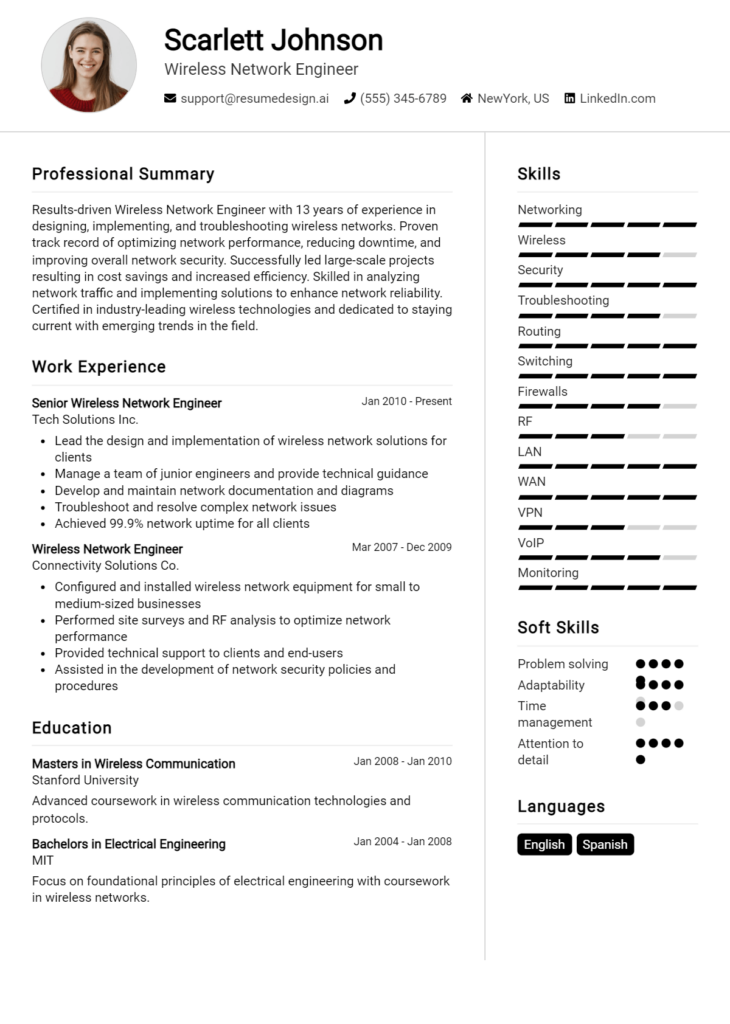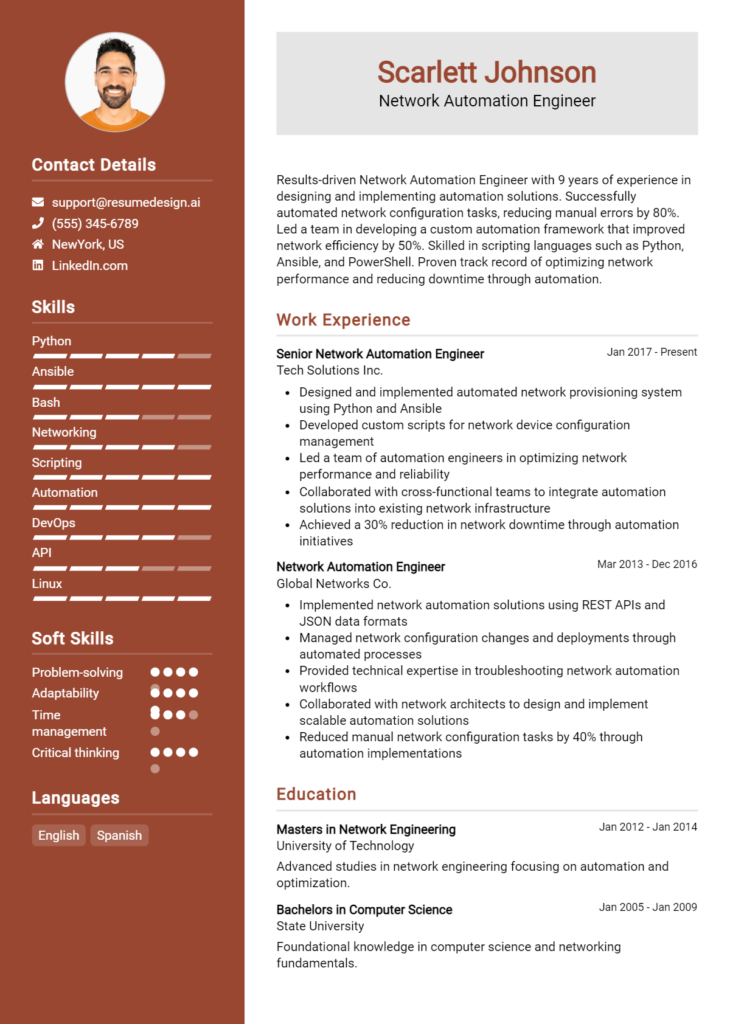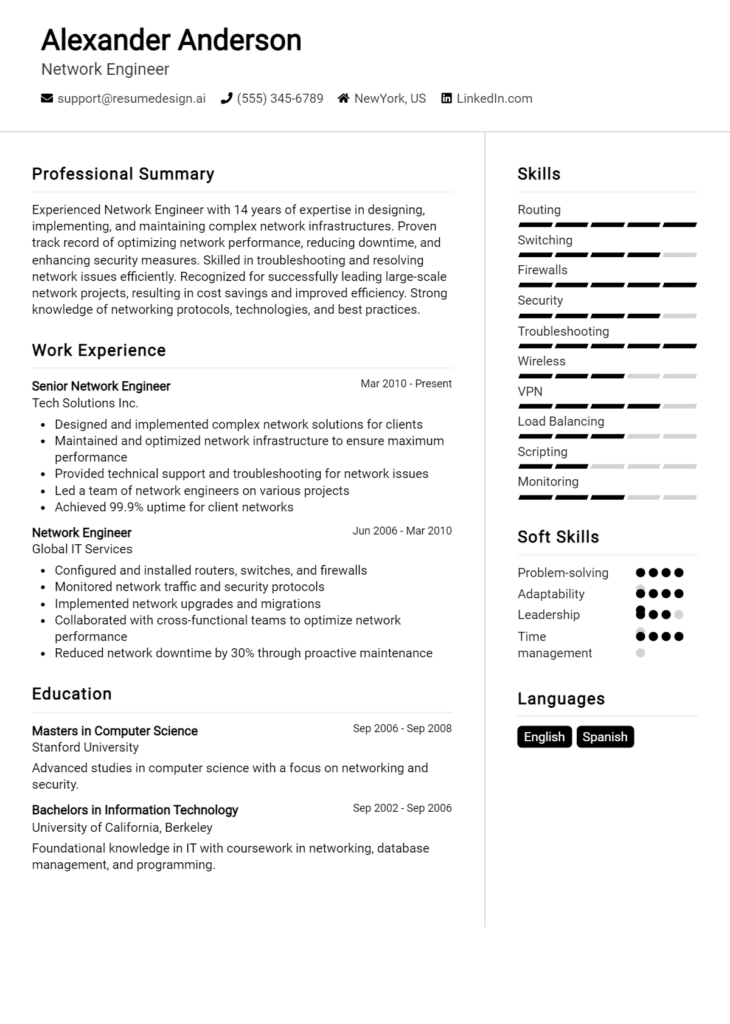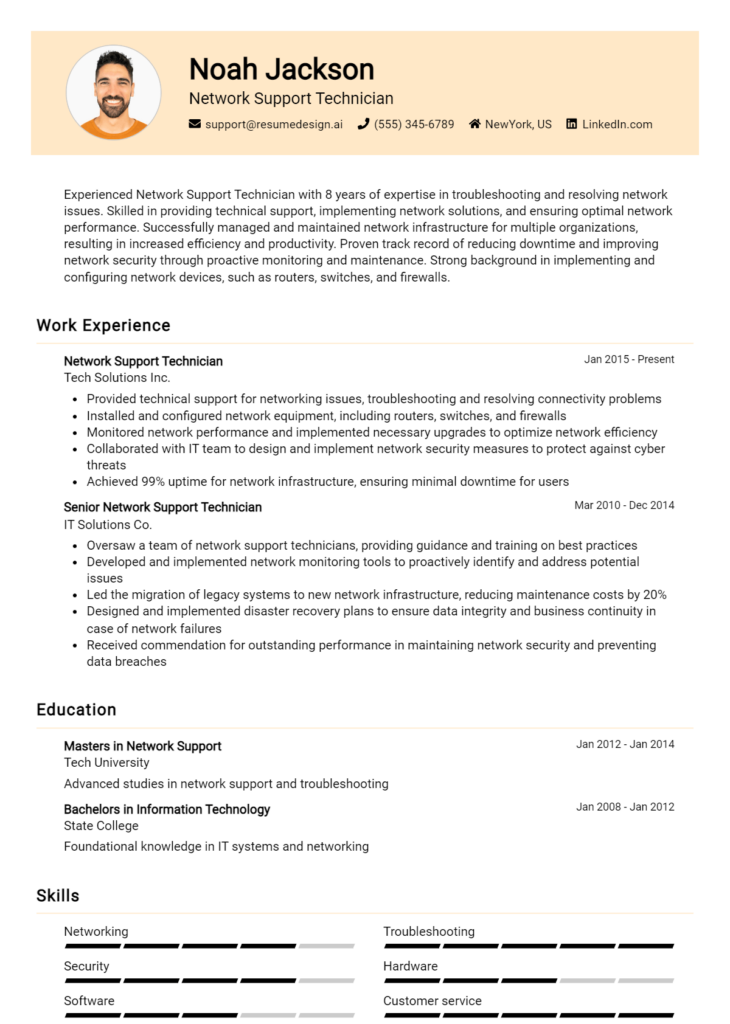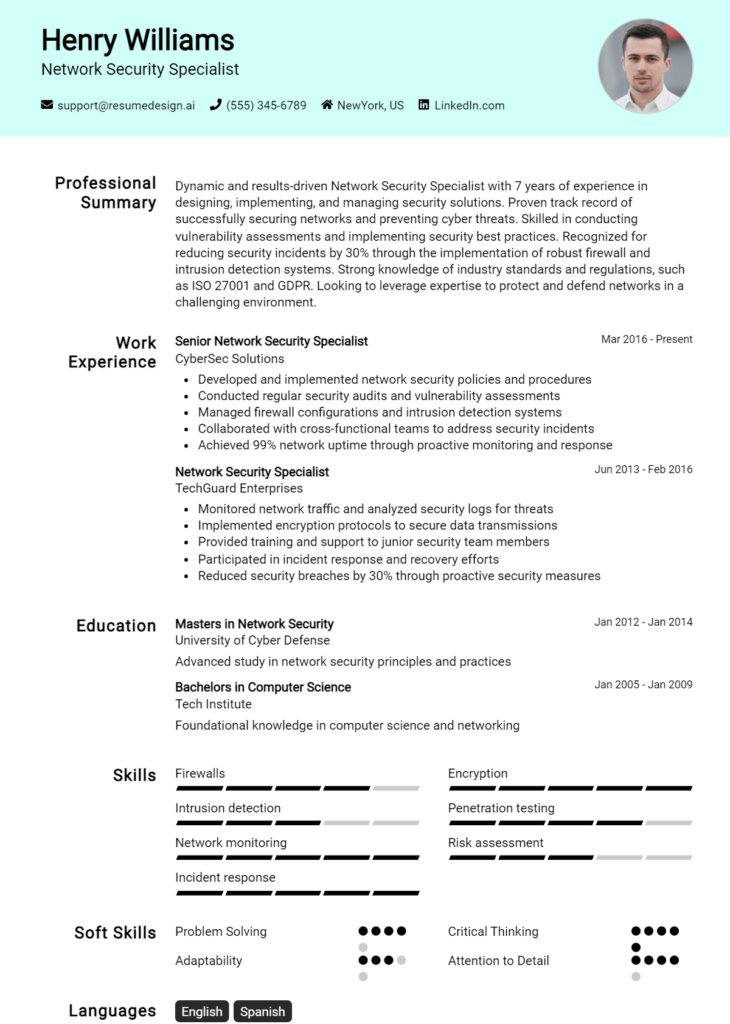Network Operations Analyst Core Responsibilities
A Network Operations Analyst plays a crucial role in ensuring seamless communication and functionality across various departments within an organization. This professional is responsible for monitoring network performance, troubleshooting issues, and implementing solutions to enhance operational efficiency. Essential skills include technical proficiency in network systems, analytical problem-solving, and effective collaboration with IT and business teams. These competencies contribute to the organization's overall goals by optimizing network reliability. A well-structured resume can effectively showcase these qualifications, highlighting both technical and operational expertise.
Common Responsibilities Listed on Network Operations Analyst Resume
- Monitor and maintain network performance to ensure optimal functionality.
- Troubleshoot and resolve network issues promptly and effectively.
- Collaborate with cross-functional teams to support network-related projects.
- Implement network upgrades and enhancements in line with business needs.
- Perform regular network assessments and risk analysis.
- Document network configurations, processes, and procedures.
- Provide technical support and training to end-users.
- Analyze network traffic and usage patterns to identify areas for improvement.
- Ensure compliance with security protocols and standards.
- Generate reports on network performance and incidents for management review.
- Assist in developing disaster recovery plans for network systems.
- Stay updated on emerging technologies and industry trends.
High-Level Resume Tips for Network Operations Analyst Professionals
In the competitive field of network operations, a well-crafted resume is crucial for making a strong first impression on potential employers. Your resume serves as the gateway to opportunity, showcasing not only your technical skills and experience but also your professional achievements. It is essential that your resume reflects your capabilities in a way that aligns with the specific demands of the Network Operations Analyst role. This guide will provide practical and actionable resume tips tailored specifically for professionals in this field, helping you to stand out in a crowded job market.
Top Resume Tips for Network Operations Analyst Professionals
- Tailor your resume to each job application by integrating keywords from the job description.
- Highlight relevant experience in network monitoring, troubleshooting, and performance optimization.
- Quantify your achievements with metrics, such as reduced downtime percentages or improved network speed.
- Showcase industry-specific skills, such as familiarity with networking protocols and security standards.
- Include certifications that are relevant to network operations, such as CCNA, CCNP, or CompTIA Network+.
- Utilize a clear and organized format to enhance readability, making it easy for hiring managers to find key information.
- Incorporate a professional summary that succinctly outlines your expertise and career goals related to network operations.
- Emphasize your problem-solving abilities and analytical skills with specific examples from past experiences.
- Keep your resume concise, ideally one page, focusing on the most relevant information to the role.
By implementing these tips, you can significantly increase your chances of landing a job in the Network Operations Analyst field. A polished resume that effectively highlights your skills, achievements, and experience will not only attract the attention of potential employers but also position you as a strong candidate in a competitive job market.
Why Resume Headlines & Titles are Important for Network Operations Analyst
In the competitive field of network operations, a well-crafted resume headline or title serves as the first impression that can significantly influence a hiring manager's perception of a candidate. For a Network Operations Analyst, this headline should encapsulate the essence of the applicant's qualifications, showcasing essential skills and experiences in a concise manner. A strong headline can immediately grab attention, making it easier for hiring managers to quickly assess the candidate's fit for the role. By being directly relevant to the job being applied for, the headline not only highlights the candidate's strengths but also sets the tone for the rest of the resume.
Best Practices for Crafting Resume Headlines for Network Operations Analyst
- Keep it concise: Aim for 6-10 words that summarize your core qualifications.
- Be role-specific: Tailor the headline to reflect the specific requirements of the Network Operations Analyst position.
- Highlight key skills: Use keywords that are relevant to network operations, such as "network monitoring," "troubleshooting," or "data analysis."
- Showcase achievements: If possible, incorporate notable achievements or certifications that set you apart.
- Use action-oriented language: Start with strong verbs or phrases that convey your expertise and impact.
- Make it relevant: Ensure that your headline aligns with the job description and reflects the skills most desired by employers.
- Avoid jargon: Use clear and straightforward language that can be easily understood by hiring managers.
- Review and revise: Take time to refine your headline for clarity and impact before submitting your application.
Example Resume Headlines for Network Operations Analyst
Strong Resume Headlines
Experienced Network Operations Analyst with Proven Troubleshooting Skills
Results-Driven Network Analyst Specializing in Network Security Solutions
Detail-Oriented Network Operations Expert with 5+ Years in Performance Optimization
Certified Network Operations Analyst with Expertise in Data Analysis and Monitoring
Weak Resume Headlines
Network Operations Analyst Seeking Job
Experienced IT Professional
Skills in Networking and Computers
Strong resume headlines are effective because they communicate a candidate's unique value proposition in a clear and engaging manner. They emphasize specific skills and achievements that align with the job, making it easy for hiring managers to see the candidate's relevance. In contrast, weak headlines fail to impress due to their vagueness and lack of focus. Generic phrases do not convey any particular strengths or insights into the candidate's capabilities, making it difficult for hiring managers to connect with the applicant's qualifications or see them as a strong fit for the role.
Writing an Exceptional Network Operations Analyst Resume Summary
A resume summary is a critical component for a Network Operations Analyst, serving as the first impression a candidate makes on hiring managers. This brief yet powerful section provides an opportunity to quickly capture attention by highlighting key skills, relevant experience, and significant accomplishments that align with the job role. An exceptional summary should be concise and impactful, tailored specifically to the position being applied for, effectively setting the tone for the rest of the resume and encouraging further review by potential employers.
Best Practices for Writing a Network Operations Analyst Resume Summary
- Quantify Achievements: Use numbers to demonstrate your impact, such as improved uptime percentages or reduced incident response times.
- Focus on Skills: Highlight specific technical skills relevant to the role, such as network troubleshooting, performance monitoring, and security protocols.
- Tailor for the Job Description: Customize your summary for each application to reflect keywords and requirements mentioned in the job posting.
- Be Concise: Aim for 2-4 sentences that convey the most important aspects of your background without being overly verbose.
- Showcase Relevant Experience: Mention past roles and projects that directly relate to network operations and their outcomes.
- Highlight Soft Skills: Include attributes like problem-solving, teamwork, and communication that are essential for collaboration in network operations.
- Use Action-Oriented Language: Start with strong action verbs to convey a sense of proactivity and effectiveness.
- Maintain Professional Tone: Ensure the summary reflects a professional demeanor appropriate for the tech industry.
Example Network Operations Analyst Resume Summaries
Strong Resume Summaries
Results-driven Network Operations Analyst with over 5 years of experience in managing and optimizing network infrastructures, achieving a 30% increase in system uptime through proactive monitoring and maintenance. Skilled in troubleshooting complex network issues and implementing effective solutions, resulting in a 25% reduction in incident response times.
Detail-oriented Network Operations Analyst with expertise in Cisco and Juniper technologies, recognized for enhancing network security protocols that decreased vulnerabilities by 40%. Proven track record of collaborating with cross-functional teams to design and implement network upgrades on time and within budget.
Dynamic Network Operations Analyst with a strong background in performance analysis and network optimization, successfully improving bandwidth utilization by 20% in a multi-site environment. Committed to leveraging analytical skills to enhance overall network efficiency and reliability.
Weak Resume Summaries
Network Operations Analyst with some experience in network management and troubleshooting. Looking to contribute to a team in a relevant position.
Motivated professional interested in network operations. Skilled in various networking tasks and eager to learn more in the field.
The strong resume summaries stand out due to their use of quantifiable outcomes, specific technical skills, and clear relevance to the job role, making them compelling and informative. In contrast, the weak summaries lack detail and specificity, providing little insight into the candidate's capabilities or achievements, ultimately failing to capture the attention of hiring managers.
Work Experience Section for Network Operations Analyst Resume
The work experience section of a Network Operations Analyst resume is crucial as it serves as a showcase of the candidate's technical skills, leadership capabilities, and track record of delivering high-quality products. This section provides potential employers with tangible evidence of the candidate's ability to manage complex network operations, optimize performance, and contribute to team success. By quantifying achievements and aligning experiences with industry standards, candidates can effectively demonstrate their value and readiness for the role.
Best Practices for Network Operations Analyst Work Experience
- Highlight relevant technical skills such as network configuration, troubleshooting, and performance monitoring.
- Use metrics to quantify results, such as reduced downtime percentages, increased network efficiency, or cost savings achieved.
- Emphasize collaboration within cross-functional teams to show your ability to work well with others and lead projects.
- Include specific tools or technologies used, like network management software or cloud services, to demonstrate expertise.
- Describe any certifications or training that bolster your qualifications in the field.
- Focus on achievements that align with industry standards and practices to appeal to potential employers.
- Utilize action verbs to convey a sense of proactivity and impact in your previous roles.
- Keep descriptions clear and concise to maintain the reader's attention and convey professionalism.
Example Work Experiences for Network Operations Analyst
Strong Experiences
- Led a team in the successful deployment of a new network infrastructure, resulting in a 30% increase in system uptime and a 15% reduction in operational costs.
- Implemented a network monitoring system that reduced incident response time by 40%, enhancing overall network performance.
- Coordinated with cross-functional teams to troubleshoot and resolve network issues, achieving a 25% improvement in service delivery time.
- Designed and executed a network security strategy that decreased vulnerabilities by 50%, safeguarding critical data and systems.
Weak Experiences
- Worked on network projects and assisted with various tasks.
- Helped to maintain network systems without specifying how.
- Participated in team meetings to discuss networking issues.
- Involved in troubleshooting network problems occasionally.
The examples listed as strong experiences are considered effective because they highlight specific achievements, quantify results, and demonstrate leadership and collaboration. In contrast, the weak experiences lack detail and metrics, making them vague and unimpressive, which fails to convey the candidate's true capabilities and impact in previous roles.
Education and Certifications Section for Network Operations Analyst Resume
The education and certifications section of a Network Operations Analyst resume plays a crucial role in demonstrating the candidate's academic foundation and commitment to professional development in the ever-evolving field of network operations. This section not only showcases relevant degrees and industry-recognized certifications but also highlights the individual's dedication to continuous learning and skill enhancement. By including pertinent coursework, specialized training, and certifications, candidates can significantly bolster their credibility and align their qualifications with the specific demands of the job role, making them more appealing to prospective employers.
Best Practices for Network Operations Analyst Education and Certifications
- Prioritize relevant degrees, such as a Bachelor’s in Computer Science, Information Technology, or Network Administration.
- Include industry-recognized certifications such as Cisco Certified Network Associate (CCNA) or CompTIA Network+.
- List specific coursework that directly relates to network operations, such as Network Security or Network Design.
- Highlight any advanced certifications or specialized training, such as Cloud Network Management or Cybersecurity Fundamentals.
- Keep the section concise while ensuring all information is current and relevant to the job description.
- Consider showcasing any ongoing education, such as workshops or online courses, to demonstrate continuous learning.
- Use clear formatting to make it easy for hiring managers to skim and identify key qualifications quickly.
- Be honest about your qualifications; avoid listing certifications that are outdated or not obtained.
Example Education and Certifications for Network Operations Analyst
Strong Examples
- Bachelor of Science in Computer Science, XYZ University, Graduated May 2022
- Cisco Certified Network Associate (CCNA), Certified June 2023
- CompTIA Network+ Certification, Achieved August 2023
- Coursework in Network Security, Cloud Computing, and Data Communications
Weak Examples
- Bachelor of Arts in English Literature, ABC University, Graduated May 2020
- Certification in Microsoft Office Suite, Obtained January 2021
- Basic Computer Skills Course, Completed February 2020
- Certification in Graphic Design, Issued March 2019
The strong examples listed above are directly relevant to the role of a Network Operations Analyst, showcasing a solid educational background and pertinent certifications that align with industry standards. In contrast, the weak examples illustrate qualifications that do not relate to the position, such as degrees in unrelated fields or certifications that do not enhance a candidate's suitability for network operations. This distinction underscores the importance of tailoring the education and certifications section to reflect a candidate's alignment with the specific demands of the job role.
Top Skills & Keywords for Network Operations Analyst Resume
In the competitive field of network operations, a well-crafted resume is essential for standing out to potential employers. For a Network Operations Analyst, highlighting both hard and soft skills is crucial, as these competencies demonstrate technical expertise and interpersonal abilities that are necessary for success in the role. Hard skills showcase your specific technical knowledge and experience, while soft skills reflect your ability to work effectively within a team and communicate with stakeholders. Together, these skill sets paint a comprehensive picture of your qualifications, making it easier for hiring managers to see your potential contributions to their organization.
Top Hard & Soft Skills for Network Operations Analyst
Soft Skills
- Problem-solving
- Communication
- Team collaboration
- Attention to detail
- Time management
- Analytical thinking
- Adaptability
- Customer service orientation
- Critical thinking
- Conflict resolution
Hard Skills
- Network monitoring and troubleshooting
- Familiarity with network protocols (TCP/IP, DNS, DHCP)
- Experience with network security measures
- Proficiency in network management tools (e.g., Wireshark, SolarWinds)
- Knowledge of cloud computing technologies
- Understanding of firewalls and VPNs
- Data analysis and reporting
- System configuration and management
- Scripting languages (e.g., Python, Bash)
- Familiarity with ITIL and IT Service Management (ITSM) practices
Enhancing your resume with a well-rounded mix of skills is vital. Additionally, showcasing relevant work experience will further solidify your candidacy as a Network Operations Analyst.
Stand Out with a Winning Network Operations Analyst Cover Letter
I am writing to express my interest in the Network Operations Analyst position at [Company Name], as advertised on [Job Platform]. With a solid foundation in network management and a keen analytical mindset, I am excited about the opportunity to contribute to your team. My experience in monitoring, troubleshooting, and optimizing network performance aligns well with the requirements of this role, and I am eager to bring my skills to [Company Name].
In my previous role at [Previous Company], I successfully managed a range of network operations tasks, including the identification and resolution of network issues, performance monitoring, and implementation of preventive measures. My hands-on experience with various networking tools and protocols, combined with my ability to analyze data and generate actionable insights, allowed me to significantly improve network uptime and reliability. I take pride in my proactive approach to network management, ensuring that systems are running smoothly and efficiently.
I am particularly drawn to the innovative projects at [Company Name] and the commitment to leveraging cutting-edge technology to enhance network capabilities. I am excited about the prospect of collaborating with a dynamic team to tackle complex network challenges and drive continuous improvement. My strong communication skills enable me to effectively collaborate with cross-functional teams, ensuring that all stakeholders are informed and engaged in the network operations process.
Thank you for considering my application. I look forward to the opportunity to discuss how my skills and experiences align with the goals of your network operations team. I am enthusiastic about the possibility of contributing to [Company Name] and am eager to bring my expertise in network management to your organization.
Common Mistakes to Avoid in a Network Operations Analyst Resume
When crafting a resume for the role of Network Operations Analyst, it's crucial to present your skills and experiences in a way that aligns with the demands of the position. However, many candidates make common mistakes that can undermine their chances of landing an interview. By avoiding these pitfalls, you can create a more compelling and professional resume that highlights your qualifications effectively.
Lack of Specificity: Failing to include specific details about your past roles can leave hiring managers unclear about your contributions. Instead of saying you "managed network operations," specify how many networks you oversaw and the technologies you used.
Generic Objectives: Using a generic objective statement can make your resume blend in with others. Tailor your objective to reflect your goals and how they align with the company’s mission or the specific role.
Overemphasis on Technical Jargon: While technical skills are essential, overloading your resume with jargon can alienate readers who may not be familiar with all the terms. Balance technical details with clear language that showcases your expertise.
Ignoring Soft Skills: Many candidates focus solely on technical skills, neglecting to highlight essential soft skills such as communication, teamwork, and problem-solving. These skills are critical for success in a collaborative environment.
Inconsistent Formatting: A poorly formatted resume can be distracting and unprofessional. Ensure that your formatting is consistent throughout, including font size, bullet points, and spacing.
Omitting Key Certifications: Certification in relevant technologies or methodologies can significantly enhance your credibility. Make sure to prominently feature any industry-standard certifications you hold, such as CCNA or CompTIA Network+.
Failure to Quantify Achievements: Instead of simply listing responsibilities, quantify your achievements with metrics to demonstrate your impact. For example, mention how you improved network uptime by a certain percentage or reduced incident response time.
Neglecting to Tailor Your Resume: Sending out a one-size-fits-all resume can be detrimental. Tailor your resume for each application by highlighting experiences and skills that are most relevant to the specific job description.
Conclusion
As a Network Operations Analyst, your responsibilities encompass monitoring and maintaining network systems, troubleshooting issues, and ensuring optimal performance. Throughout this article, we have explored the vital skills required for this role, such as analytical thinking, proficiency in network protocols, and experience with network monitoring tools. Additionally, we highlighted the importance of effective communication and collaboration with cross-functional teams to enhance overall network performance.
In conclusion, it’s crucial to ensure that your resume reflects your expertise and aligns with the expectations of employers in this competitive field. Take a moment to review your Network Operations Analyst resume and make any necessary updates to showcase your skills and accomplishments.
To assist you in this process, consider utilizing resources such as resume templates, which can help you structure your document effectively, or the resume builder that allows you to create a polished resume in minutes. You can also explore resume examples for inspiration and cover letter templates to complement your application. Take the next step in your career by refining your resume today!

